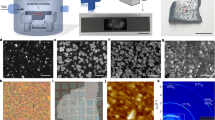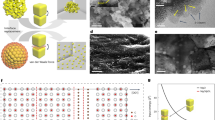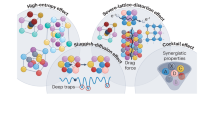Abstract
THIS compound was first described by Roy1,2, who considered it to be 9CaO.6SiO2.H2O. Further work now shows that, while specimens prepared at relatively low temperatures and pressures may be hydrated, those prepared at sufficiently high temperatures and pressures are anhydrous, with the composition Ca3Si2O7. They also establish the approximate unit cell parameters.
This is a preview of subscription content, access via your institution
Access options
Subscribe to this journal
Receive 51 print issues and online access
$199.00 per year
only $3.90 per issue
Buy this article
- Purchase on Springer Link
- Instant access to full article PDF
Prices may be subject to local taxes which are calculated during checkout
Similar content being viewed by others
References
Roy, D. M., J. Amer. Ceram. Soc., 41, 293 (1958).
Roy, D. M., Amer. Mineralogist, 43, 1009 (1958).
Heller, L., and Taylor, H. F. W., “Crystallographic Data for the Calcium Silicates” (H.M.S.O., 1956).
Howison, J. W., and Taylor, H. F. W., Mag. Concrete Res., 9, 13 (1957).
Gard, J. A., Brit. J. App. Phys., 7, 361 (1956).
Author information
Authors and Affiliations
Rights and permissions
About this article
Cite this article
ROY, D., GARD, J., NICOL, A. et al. New Data for the Calcium Silicate, ‘Phase Z’. Nature 188, 1187–1188 (1960). https://doi.org/10.1038/1881187b0
Issue Date:
DOI: https://doi.org/10.1038/1881187b0
This article is cited by
-
Quantum Mechanical Metric for Internal Cohesion in Cement Crystals
Scientific Reports (2014)
-
Ca8Si5O18 and the Nature of “γ-Dicalcium Silicate Hydrate”
Nature (1966)
-
Kilchoanite, a Polymorph of Rankinite
Nature (1961)
Comments
By submitting a comment you agree to abide by our Terms and Community Guidelines. If you find something abusive or that does not comply with our terms or guidelines please flag it as inappropriate.



